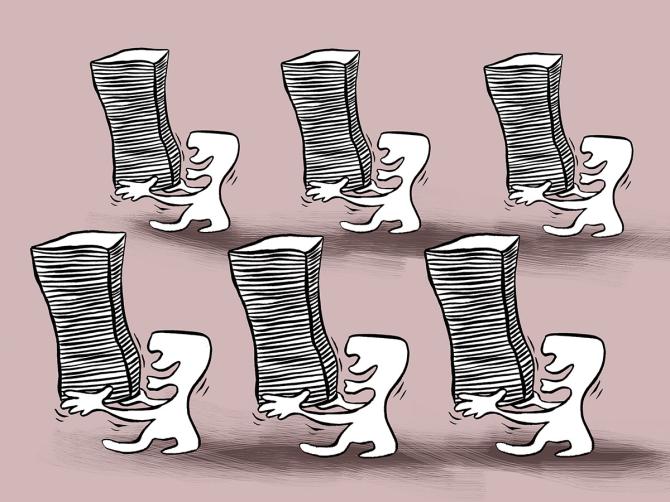''Sebi has to make sure that investor interests are protected and at the same time, there isn't over-regulation so that companies don't get discouraged to list here.'

Ajay Tyagi's four-year-and-nine-month stint as chairman of market watchdog Securities and Exchange Board of India has been largely successful.
He helped the market ecosystem ride through the pandemic, oversaw record IPO mobilisation, brought technology advancement for crackdown on insider trading, and introduced a new risk-mitigation framework to protect millions of new investors entering the markets.
In an exclusive interview with Samie Modak/Business Standard, Tyagi shares his views on various issues concerning the markets.
The first of a multi-part interview:
There are concerns around pricing of start-up IPOs. Does Sebi want to get in?
Sebi as a regulator doesn't -- and should not -- get into valuations.
Worldwide, IPOs (initial public offerings) follow a disclosure-based regime.
As far as growth companies are concerned, they are loss-making but investors invest considering their growth potential.
Start-up IPOs have only started happening recently.
It is a new type of investment and investors are getting used to it.
Earlier, many of these tech companies were eyeing overseas listings.
Getting listed here provides an opportunity for domestic investors to participate.
As we go ahead, there will be learnings. We issued a consultation paper recently in this regard.
The discussion paper signals that Sebi has some concerns about anchor lock-in, secondary sales, and the use of fresh proceeds?
As I said earlier, based on experience gained and feedback received from various stakeholders, there are bound to be learnings going forward.
The challenge before Sebi is to find the right balance in regulatory architecture.
It (Sebi) has to make sure that investor interests are protected and at the same time, there isn't over-regulation so that companies don't get discouraged to list here.
We have a record Rs 1 trillion mop-up via IPOs this year. How has Sebi managed to handle such a load of vetting and clearing IPO documents?
Sebi staff has managed the work well.
In fact, despite the rise in filings this year, the average number of days taken for issuance of the letter of observations has come down.
For a company that is not right for the markets, there are sufficient barriers to entry.
Sebi treats such challenges as an opportunity to further improve the system.
What is your view on regulating cryptocurrencies?
It is for the government to take a view. We have given our views to the government. What our views are is between us and the government.
There are mutual fund ETFs that give an indirect exposure to the crypto world. Is Sebi comfortable with that?
The right way would be to wait for government policy on the matter.
Market infrastructure institutions (MIIs) have talked about the benefits of blockchain technology. What's the progress on that?
MIIs have taken initiatives at this front.
As an example, depository firms NSDL and CDSL are developing a project on blockchain and distributed ledger technology (DLT) in the area of debenture issuance.
The system will be used for recording and monitoring of security created and monitoring of covenants of non-convertible securities.
There is a lot of potential usage of blockchain tech in the securities market, including for stock exchanges, depositories, and clearing corporations.
We are encouraging them to use this technology.
Sebi has given a long runway for T+1 implementation. Is it due to FPI (foreign portfolio investor) pressure?
There is no pressure. But you should remember that we are the first major jurisdiction in the world to shift to T+1.
Even the US is still in the discussion stage.
We want an implementation that is smooth and acceptable to everyone.
T+1 implementation would start in a phased manner, beginning February 2022.
We have taken everyone on board. T+1 settlement is in everyone's interest.
Are there any worries around FPI flows at the moment?
So far this financial year, net FPI flows in the secondary market are negative.
Despite that, the Indian market continues to be resilient because of the relatively larger participation of individual and domestic institutional investors (DIIs).
As of now, there doesn't seem to be any cause of worry on account of movements in FPI investment in equities.
Feature Presentation: Aslam Hunani/Rediff.com













 © 2025
© 2025